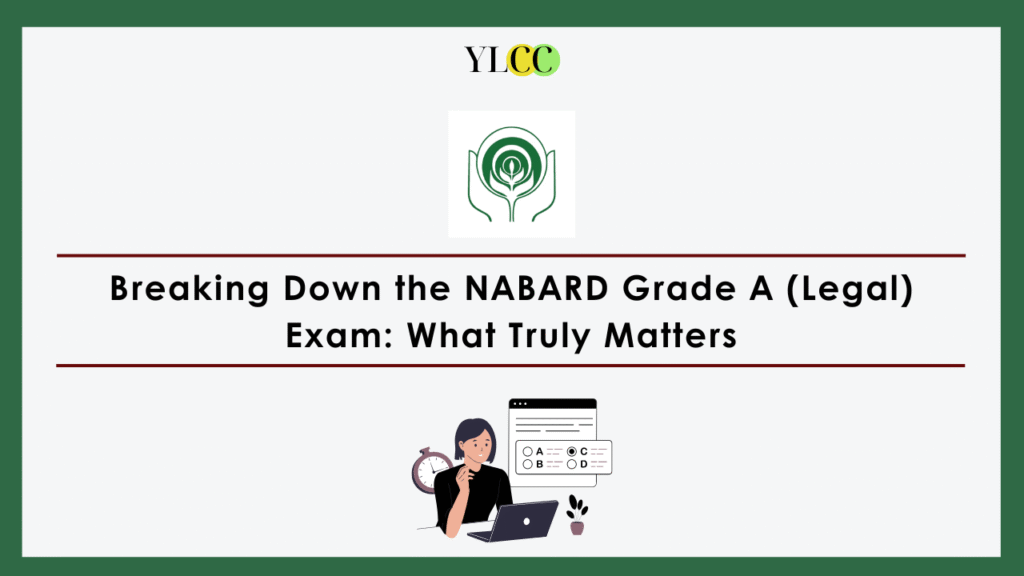
If you aim to become an Officer (Grade “A”) at the National Bank for Agriculture and Rural Development (NABARD), you’re not simply applying for another government post, you’re stepping into the heart of India’s agriculture rural development banking ecosystem.
NABARD plays a pivotal role in strengthening India’s agricultural and rural credit structure. It funds cooperative banks and regional rural banks, supports microfinance initiatives, and anchors numerous programs that touch the lives of millions in rural India.
Serving as a Grade A Officer (Legal Service) is not just about interpreting laws, it’s about ensuring that every financial and developmental initiative the Bank undertakes is legally sound, transparent, and socially impactful. You’re not a spectator to development; you’re one of its architects.
To excel in this exam, aspirants must approach it with precision, strategy, and discipline; beginning with a solid grasp of the designation, selection process, syllabus, and the exam pattern.
Why the Legal Stream at NABARD Is a Unique Challenge
Most competitive exams for legal aspirants focus on conventional subjects like the Indian Contract Act, Constitutional Law, or Civil Procedure Code (CPC). But NABARD’s Legal Officer role demands more.
It asks for a lawyer who understands not just statutes, but also the institutional and developmental frameworks that shape India’s rural economy.
Legal Officers at NABARD ensure that the Bank’s operations from agricultural credit and infrastructure financing to cooperative banking comply with statutory and regulatory norms. The work would involve assignments like:
- Drafting and vetting loan and guarantee agreements
- Advising on contracts and policy matters
- Handling litigation and arbitration
- Ensuring adherence to the RBI, Government of India, and NABARD’s internal guidelines
What makes this role uniquely challenging is its intersection of law, banking, and rural development policy. You’ll deal with complex issues under the Banking Regulation Act, SARFAESI, NABARD Act, IBC, and even Cooperative Acts- areas that go far beyond standard law school coverage.
It’s a role that requires both legal precision and developmental empathy. You’ll interpret the law not in isolation, but in the context of financial inclusion, agriculture, and rural transformation.
Structure of the NABARD Grade A (Legal Stream) Examination
The NABARD Grade A (Legal Service) exam is conducted in three phases:
Phase I – Preliminary Examination (Online Objective Test)
This is a screening test, common for all streams (including Legal). It assesses reasoning, aptitude, and general awareness with a strong focus on rural and economic issues.
Key Highlights:
- Type: Objective (MCQs)
- Marks: 200
- Duration: 120 minutes
- Mode: Online
- Negative Marking: 0.25 marks per wrong answer
The Preliminary Examination comprises multiple sections designed to assess a range of abilities and competencies. The breakup of the sections in the Preliminary Examination is as follows:
Sections in Prelims:
| Section | Questions | Marks | Remarks |
| Reasoning | 20 | 20 | Qualifying |
| English Language | 30 | 30 | Qualifying |
| Computer Knowledge | 20 | 20 | Qualifying |
| Quantitative Aptitude | 20 | 20 | Qualifying |
| Decision Making | 10 | 10 | Qualifying |
| General Awareness | 20 | 20 | Merit Section |
| Economic & Social Issues (ESI) | 40 | 40 | Merit Section |
| Agriculture & Rural Development (ARD) | 40 | 40 | Merit Section |
Shortlisting for Phase II is based only on marks from the Merit Sections (GA, ESI, ARD).
Once you’ve cleared the Preliminary stage, the focus shifts to Phase II – a more specialized and analytical test that evaluates your legal and writing proficiency.
Phase II – Main Examination
Tests analytical ability, writing skills, and professional knowledge.
| Paper | Type | Duration | Marks | Description |
| Paper I | Descriptive (English) | 90 minutes | 100 | Essay, précis, comprehension, report or letter writing |
| Paper II (Legal) | Objective + Descriptive | 120 minutes | 100 | Professional knowledge in law |
With the structure of the Main Examination understood, it’s crucial to explore the detailed legal syllabus that forms the backbone of this phase.The following list covers the subject areas that candidates must focus on for Paper II (Legal):
Legal Syllabus (as per official notification):
- Constitution of India
- Administrative Law
- Company Law
- Banking Regulation Act, 1949
- Reserve Bank of India Act, 1934
- NABARD Act, 1981
- Negotiable Instruments Act, 1881
- SARFAESI Act, 2002
- Indian Contract Act, 1872
- Industrial & Labour Laws
- Information Technology Act, 2000
- Transfer of Property Act, 1882
- Law of Evidence
- Code of Civil Procedure, 1908
- Law of Limitation
- Arbitration and Conciliation Act, 1996
- Principles of Natural Justice and drafting of pleadings
The objective section tests conceptual understanding; the descriptive section tests your ability to apply the law through analytical or case-based questions.
After mastering the written examinations, the final stage – the Interview – assesses your understanding, confidence, and motivation to serve in NABARD’s legal framework.
Phase III – Interview
Marks: 50
Focus Areas:
- Understanding of NABARD’s role in rural development
- Legal and financial awareness
- Policy interpretation skills
- Motivation to serve in a development finance institution
The final merit list is prepared based on marks in Phase II and the Interview.
With all three phases clearly mapped out, the next step is to strategize your preparation effectively to maximize performance in every stage.
How to Prepare for NABARD Grade A (Legal Stream)
Cracking NABARD’s Legal stream requires more than rote learning – it needs clarity, strategy, and awareness of how the law connects to development finance.
1. Understand the Weightage and Prioritize Accordingly
| Phase | Focus | Approach |
| Phase I – Prelims | GA, ESI, ARD | Focus on current affairs (economy, rural development), basic concepts in ESI & ARD. |
| Phase II – English | Articulation & structure | Practice essays on topics like financial inclusion, digital banking, or rural entrepreneurship. |
| Phase II – Legal | Core law + application | Study statutory provisions, case laws, and their implications for rural banking. |
| Interview | Conceptual clarity | Be ready to connect legal principles to NABARD’s mission and real-world initiatives. |
Understanding the exam structure is only the beginning – now, let’s break down the core legal areas that every aspirant must master.
2. Core Legal Areas to Master
Banking & Financial Laws: Banking Regulation Act, RBI Act, NABARD Act, SARFAESI, IBC, NI Act
General & Commercial Laws: Contract, Companies, Partnership, TPA, Evidence, Limitation, Arbitration
Public & Administrative Laws: Constitution, Administrative Law, RTI
Labour & Cooperative Laws: Industrial Disputes, Trade Unions, Cooperative Societies
Technology & Emerging Areas: IT Act, Cyber Law, E-Contracts, Digital Banking
Having understood the core legal domains required for this examination, let’s now shift to the economic and rural development context that plays an equally crucial role in the Legal stream at NABARD.
3. Economic & Rural Development Context
Even as a law candidate, you must know NABARD’s policy environment:
- Rural credit systems, agricultural finance, microfinance
- Government schemes (PM-KISAN, PMFBY, SHG-BLP, etc.)
- Rural infrastructure and cooperative models
Recommended Sources:
- NABARD Annual Report
- PIB & Kurukshetra Magazine
- Economic Survey (Agriculture chapters)
With clarity on the developmental and policy ecosystem surrounding NABARD, the next step is to structure your preparation through a practical and time-bound study plan.
4. Suggested 12–14 Week Study Plan
| Weeks | Focus | Key Tasks | |
| 1-3 | Foundation | Revise core acts – Contract, Constitution, CPC | |
| 4-6 | Specialized Acts | Cover NABARD Act, SARFAESI, RBI Act, IBC | |
| 7-9 | Writing & Current Affairs | Practice descriptive English + legal writing | |
| 10-12 | Revision & Mocks | Attempt mock tests; revise key sections | |
| 13-14 | Final Prep | Short notes, case law recall, interview prep |
Once you have a strategic preparation timeline in place, the next question is where to study from – and that’s where the right resources make all the difference.
5. Recommended Resources
- Bare Acts: Always first priority.
- Books:
- M.P. Jain – Indian Constitutional Law
- Avtar Singh – Law of Contract & Specific Relief
- Tannan – Banking Law and Practice in India
- Taxmann – Guide to SARFAESI & IBC
- Online:
- NABARD official website
- RBI circulars
- EduTap / ixamBee for practice
With the subjects, strategy, and resources aligned, it’s important to take a step back and reflect on why the NABARD Legal Officer role stands apart as a meaningful and rewarding career path.
The Takeaway: Why NABARD’s Legal Role Is a Career Worth Pursuing
If you’ve ever wanted a legal career that blends intellect with impact, NABARD’s Legal Officer role is one of the few that truly delivers both.
At NABARD, your legal expertise fuels development – you’re helping design frameworks that empower farmers, cooperatives, and rural entrepreneurs. Every contract you draft or regulation you interpret strengthens the foundations of India’s rural economy.
It’s not just about compliance – it’s about using the law as a tool for social and financial transformation.So, as you prepare for the NABARD Grade A (Legal) exam, remember: you’re not just studying for a government post. You’re preparing to become a part of India’s development story, where law meets purpose.






